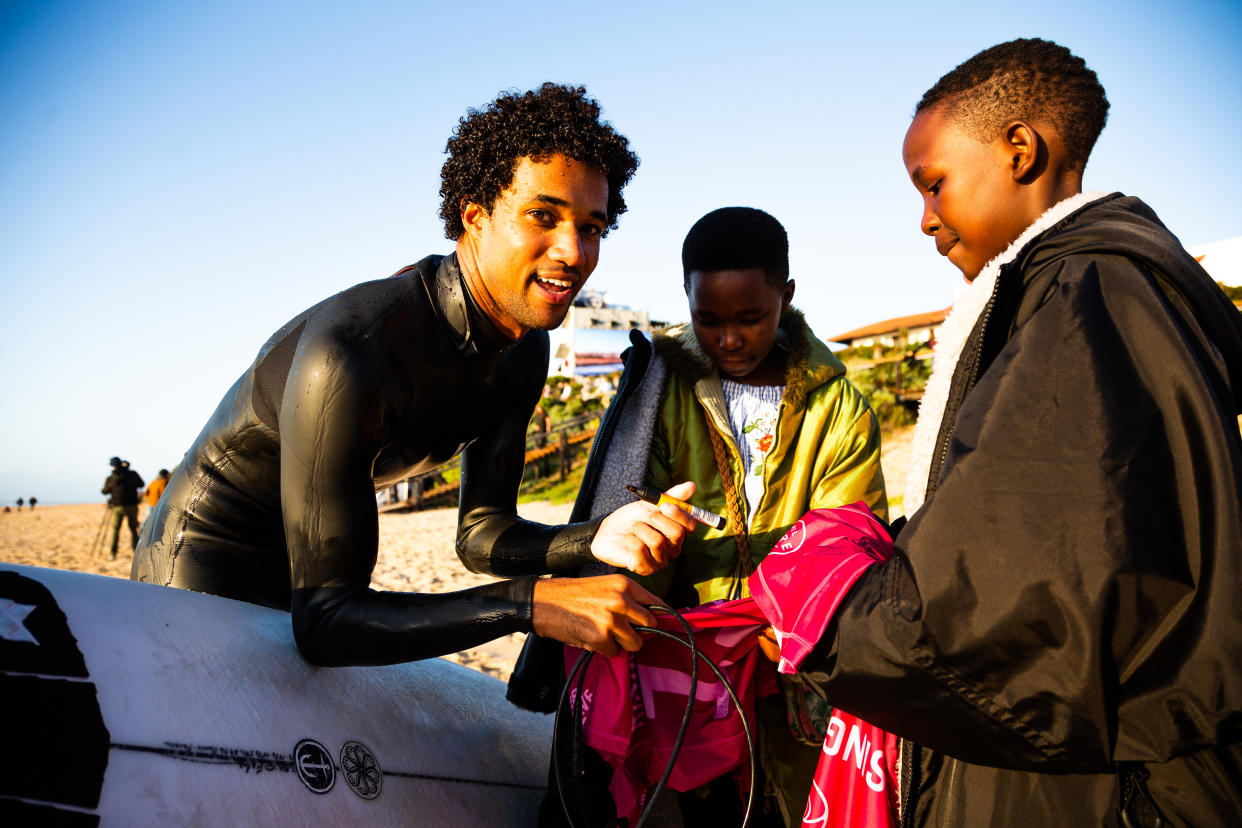Mikey February riding waves to change and bringing surfing access to Black children
If you're well-versed in surfing, the name Mikey February shouldn't sound foreign. Appropriately dubbed "Africa's Greatest Surfer," the South Africa native has dazzled on the water for years, taking his talents around the world to ride the waves of Hawaii, West Africa and more.
The child of a surfer, February's relation within the industry is arguably significant. Apartheid-era laws prevented his father, Isaac February, from ripping the same waves his 28-year-old son is familiar with today. As one of the only Black surfers on the Championship Tour, February's focus in the sport goes far beyond his success on the water or well-earned endorsements.
When the pandemic forced the cancellation of February's touring schedule, he shifted focus to another passion: improving the lives of African children through the foundation February co-founded with his wife, Zelti. JUJU Surf Club works alongside other surf programs in Africa to share resources and connect local leaders to global brands.
During the Vans Triple Crown of Surfing competition in Oahu, Hawaii, February spoke with Yahoo Sports about how he developed his love of surfing and the direction he and Zelti want to take JUJU Surf Club in 2022 and beyond.

Yahoo Sports: How did your love of surfing begin?
Mikey February: My dad was a surfer before I was born. He used to surf and skate, and growing up and wanted to share everything with me and I wanted to do everything with him. When I first took a turn on the water as a young boy, it was an incredible feeling, and from there, I was hooked.
YS: Could you elaborate on what that "feeling" was?
MF: Ha, it's hard to explain, you know. I mean, I think just being in a natural element like the ocean. Obviously, the water can be intimidating and stuff. But I think there's something that's exciting about trying to like, become comfortable in a place like the ocean. It's challenging, it's always different, and I was very drawn to that.
YS: Surfing is such a beautiful sport, but it's not particularly diverse. In an effort to change that, can you open up about JUJU Surf Club and their mission to introduce more Black children to the sport?
MF: Sure. I think for me, I was just fortunate to have been brought up in the sport. I think that that kind of made it a little bit easier to end up going the professional route. But there's a community element to surfing, and my wife and I started the foundation to support surf organizations across Africa.
A lot of kids can't really picture themselves doing this sort of thing. We want everyone who goes through our program to know it's possible to gain mentorship and a love of surfing from their backyard. I've traveled throughout Africa and being by the water fishing or doing anything else is a large part of people's everyday lives. After all, Africa has some of the world's best waves.
YS: So, it's not a matter of if we'll see a larger presence of African-born surfers but rather when.
MF: Right. It's pretty awesome because we already see the possibility of surfing becoming a popular sport in Africa. There are already so many organizations and individuals in Africa committed to this mission, so it's cool to see people taking an interest already. It's all about raising awareness and lending our support in whatever we can do to propel the sport on a more noticeable level. If a child sees themselves in me, then I'm confident I've done my job.
February and Vans recently dropped Volume 2 of Sonic Souvenirs, a series focused on the intersection of surf, art and culture told through the perspective of February himself.


